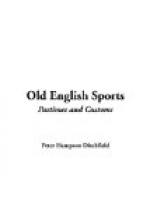Twelfth Night was a very popular festival, when honour was done to the memory of the Three Wise Men from the East, who were called the Three Kings. The election of kings and queens by beans was a very ancient custom. The farmer invited his friends and labourers to supper, and a huge plumcake was brought in, containing a bean and a pea. The man who received the piece of cake containing the bean was called the King of the Bean, and received the honour of the company; and the pea conferred a like privilege on the lady who drew the favoured lot. The rest of the visitors assumed the rank of ministers of state or maids of honour. The festival was generally held in a large barn decorated with evergreens, and a large bough of mistletoe was not forgotten, which was often the source of much merriment. When the ceremony began, some one repeated the lines—
“Now, now
the mirth comes
With the
cake full of plums,
When Bean is King of
the Sport here.
Beside,
you must know,
The Pea
also
Must revel as Queen
of the Court here.”
Then the cake was cut and distributed amid much laughter and merry shouts. The holders of the bean and pea were hailed as king and queen for the night, the band struck up some time-honoured melody, and a country dance followed which was ever carried on with much spirit. The king exercised his royal prerogative by choosing partners for the women, and the queen performed a like office for the men; and so they merrily played their parts till the hours grew late.
But the holidays were nearly over, and the time for resuming work had arrived. However, neither the women nor the men seemed to be in any hurry to begin. The day after Twelfth Day was humorously called St. Distaft’s[3] Day, which was devoted to “partly work and partly play.” Herrick, the recorder of many social customs, tells us that the ploughmen used to set on fire the flax which the maids used for spinning, and received pails of water on their heads for their mischief. The following Monday was called Plough Monday, when the labourers used to draw a plough decked with ribbons round the parish, and receive presents of money, favouring the spectators with sword-dancing and mumming. The rude procession of men, clad in clean smock-frocks, headed by the renowned “Bessy,” who sang and rattled the money-box, accompanied by a strangely-dressed character called the Fool, attired in skins of various animals and having a long tail, threw life into the dreary scenery of winter, as the gaily-decked plough was drawn along the quiet country lanes from one village to another. The origin of Plough Monday dates back to pre-Reformation times, when societies of ploughmen called guilds used to keep lights burning upon the shrine of some saint, to invoke a blessing on their labour. The Reformation put out the lights, but it could not extinguish the festival.
In the long winter evenings the country folk amused themselves around their winter’s fireside by telling old romantic stories of errant knights and fairies, goblins, witches, and the rest; or by reciting




